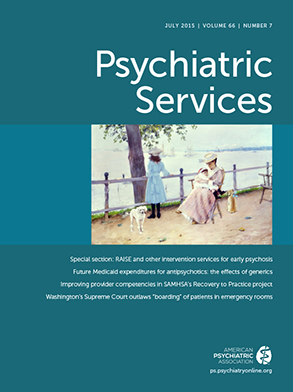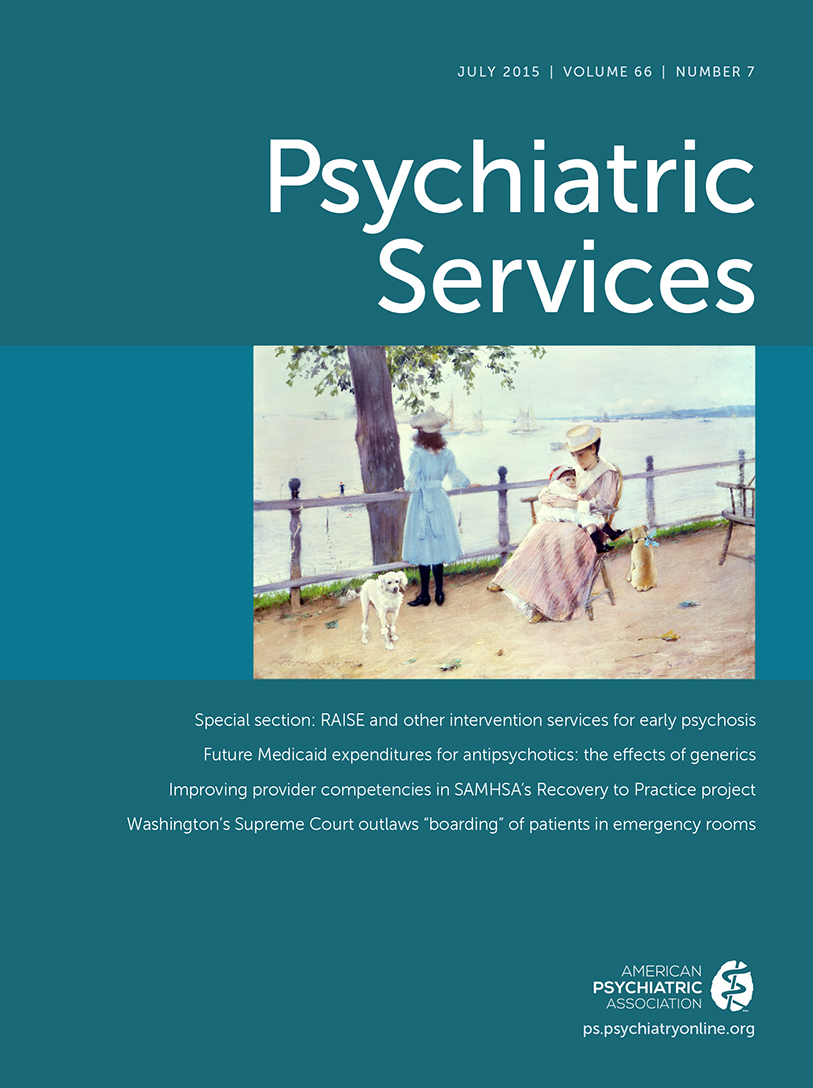Duration of untreated psychosis (DUP) is the time between onset of psychotic symptoms and initiation of antipsychotic medication. Three influential meta-analyses (
1–
3) reported modest associations between longer DUP and poorer prognosis. This relationship persisted after the analyses controlled statistically for the effects of other variables, including premorbid functioning, suggesting that DUP may have a unique role in determining outcome (
4).
DUP is a particularly important prognostic factor because it can be reduced by enhancing early detection and treatment referral procedures (
5). Previous studies conducted in U.S. academic settings reported average DUPs ranging from 61 to 166 weeks (
6–
10). This investigation examined DUP and its correlates among patients enrolled between July 2010 and July 2012 in a study of first-episode psychosis (FEP) specialty care at a diverse set of community mental health centers in the United States. Results are compared with recommended standards for early psychosis intervention (
11).
Methods
The Early Treatment Program (ETP) study is part of an initiative by the National Institute of Mental Health (NIMH) called Recovery After an Initial Schizophrenia Episode (RAISE). RAISE-ETP is a randomized comparison of NAVIGATE, a specialized and team-based approach to FEP care, and general community care. NAVIGATE is a multicomponent treatment package that includes medical management (guided by a computerized decision support system), individual resilience-focused psychotherapy, family psychoeducation, and supported employment and education. Intervention components are offered within a framework of shared decision making and are implemented according to patient preference. Community care is psychosis treatment determined by clinician choice and service availability.
Thirty-four community treatment centers were selected for RAISE-ETP following a national search. Site eligibility criteria included interest in offering early intervention services for FEP, sufficient staff to implement NAVIGATE, ability to recruit an adequate number of subjects for a clinical trial, and institutional assurance that all research assessments would be completed. Academic centers or sites with existing FEP treatment programs were excluded. In addition to considering the treatment centers’ capacity to perform the clinical trial, the site selection process also considered the center’s geographic and demographic diversity. Participating sites are located in 21 of the 48 contiguous U.S. states.
The study was approved by the Institutional Review Board (IRB) of the North Shore-LIJ Health System (the coordinating center) and IRBs at participating sites. Written informed consent was obtained from adult participants and legal guardians of participants under 18 years old, who provided written assent. The NIMH Data and Safety Monitoring Board provided study oversight.
A total of 404 individuals between the ages of 15 and 40 who presented for treatment following psychosis onset were enrolled. DSM-IV diagnoses of schizophrenia spectrum disorder, brief psychotic disorder, or psychotic disorder NOS were included; diagnoses of affective psychosis, substance-induced psychotic disorder, and psychotic disorder due to general medical conditions were excluded. Diagnoses of neurological disorders, clinically significant head trauma, or other serious medical conditions were also excluded. All participants had taken antipsychotic medications for six months or less over their lifetime and were proficient in English.
Assessments included the Structured Clinical Interview for DSM-IV Axis I Disorders (SCID) for diagnosis, the Positive and Negative Syndrome Scale for psychopathology, and the Heinrichs-Carpenter Quality of Life Scale (QLS) for social functioning. These measures and the determination of DUP were completed by centrally located interviewers during live, two-way video patient interviews. Interviewers were certified for RAISE-ETP by achieving agreement with master interviewers on ascertainment of diagnosis, onset of first psychotic symptoms, and DUP. Conferences to review interviewers' ratings were held biweekly to maintain certified raters’ reliability.
Information sources for baseline assessments were participants’ self-report and a structured summary of the participants’ symptoms and treatment history. The summary was completed at each site on the basis of patient records, such as referral documents, and family interviews, if available. The structured summaries were provided to the interviewers prior to the assessments. When patients’ accounts, structured summaries, and family descriptions varied, interviewers asked the participants further questions to resolve discrepancies. After completing the SCID section on psychotic symptoms, the interviewers determined the onset date of the first psychotic symptom. DUP was defined as the period between onset of that symptom and initial treatment with antipsychotic medications.
This report summarizes data for additional participant- and site-level variables, including gender, age, race, ethnicity, insurance status at enrollment (private, private and public, public only, and none), geographic region (North, South, Midwest, and West), and population density (rural, suburban, and urban).
Because DUP was positively skewed, it was normalized for parametric statistics by taking the logarithm to base 10 (log10DUP). Because of the nonnormal distribution, Spearman’s correlations were used to determine associations between DUP and clinical variables; t tests and analyses of variance (ANOVAs) were used for group comparisons. All analyses used SPSS Statistics, version 20.
Results
Table 1 presents weeks of DUP for participants grouped by characteristic.
Participants had a mean±SD age of 23.6±5 years; a majority (N=283, 70%) were between 15 and 24 years old (ages 15–19, N=109, 27%; 20–24, N=174, 43%; 25–29, N=73, 18%; and >30, N=48, 12%). Mean DUP for the entire sample was 193.5±262.2 weeks (median=74 weeks; range 1–1,456 weeks). Most participants (N=268, 68%) had DUP of more than six months. No association between gender, race, and ethnicity and DUP was observed. Longer DUP was associated with younger age at onset of first psychotic symptom (ρ=.24, df=401, p<.001) and older age at RAISE-ETP enrollment (ρ=.31, df=401, p<.01).
DUP was shorter for individuals with prior psychiatric hospitalizations (t=−7.02, df=401, p<.001) but was unrelated to age at first inpatient admission or number of hospitalizations. DUP was shorter for individuals who entered RAISE-ETP from acute care settings (psychiatric inpatient or partial hospital programs) compared with those who were receiving outpatient services when they entered the study (F=−3.84, df=2 and 400, p<.05).
At baseline assessment, longer DUP was associated with higher levels of positive symptoms (ρ=.23, df=401, p<.01) and general psychopathology (ρ=.18, df=401, p<.05) and with lower QLS scores (ρ=.11, df=401, p<.05) but not with negative symptoms. Persons with substance use disorders had longer DUP compared with persons without a substance use disorder (t=3.21, df=401, p<.01). A comparison of participants with DUP greater than or less than six months revealed similar results.
Details regarding geographic region, community population density, and participants’ insurance status are presented in
Table 1. ANOVA models were significant only for geographic region (F=6.39, df=3 and 399, p<.001). DUP was significantly shorter for participants living in northern states compared with those from midwestern and southern states. No differences in DUP were observed for rural, suburban, or urban location or for insurance status.
Discussion
We found a median DUP of 74 weeks among a group of community clinics that did not offer early detection and intervention services for FEP. Clients in these settings followed myriad routes to psychosis care, including discharge from acute care settings (psychiatric hospital and partial hospital programs), referral by outpatient health care professionals or family members, and self-selection. The fact that DUP was greater than six months for 68% of FEP clients is cause for concern, given that the six-month period after a first episode of psychosis may be a critical period for intervention (
12). Mean DUP was greater than six months in three of four geographic regions, suggesting that treatment delays for FEP are common throughout the United States. Clearly, prolonged DUP is an issue of national importance.
When NIMH announced the RAISE initiative in 2008, it stipulated that the research be conducted in “real world” community treatment settings with sufficient interest and capacity to implement coordinated specialty care models for FEP. To ensure that RAISE-ETP would be comparable with other FEP intervention studies, NIMH further specified that the clinical trial should include persons in the early stages of psychotic illness with presenting problems that could plausibly lead to a diagnosis of schizophrenia. Given that the RAISE-ETP study met these criteria, the DUP findings reported here are likely to generalize to care settings with similar characteristics and to persons with early nonaffective psychosis. However, DUP findings may differ in treatment settings that have well-established FEP clinics, are associated with academic FEP research programs, or offer specialty care services for a broader spectrum of psychotic disorders.
Earlier investigations of DUP in the United States originated at a handful of academic research centers and utilized highly selective procedures for recruiting subjects for FEP studies (
6–
10). In contrast, our data came from the first national study of FEP in the United States, which engaged a broader range of persons with FEP who sought treatment in community mental health centers across 21 states. Our findings about symptomatic and functional correlates of DUP at initial assessment are consistent with prior work, as summarized in a meta-analysis by Marshall and colleagues (
2) of DUP and outcomes among patients with FEP. More important, our data clearly demonstrate that patients in community treatment centers in the United States have prolonged DUP and support recent federal initiatives to improve rapid access to FEP treatment services (
www.congress.gov/bill/113th-congress/house-bill/3547).
Many variables can impact DUP, including patient and family factors that influence help seeking, health care providers’ competence in recognizing early psychotic symptoms, and health system characteristics that impede timely referral to specialized psychiatric care (
13,
14). Outside the United States, several health systems have reduced DUP by identifying and selectively targeting malleable components of delay within these broad categories (
5,
12). We did not observe any unique demographic characteristics that were associated with treatment delays, but DUP was significantly longer for participants who had been receiving outpatient mental health services before enrolling in RAISE-ETP. There may be multiple reasons for this finding, but outpatient treatment settings clearly represent one target for DUP reduction efforts. For example, Brunet and colleagues (
15) have suggested providing FEP training for community mental health providers as a means of reducing overall DUP, including standardized protocols for the definition and treatment of early psychosis.
Our finding that DUP was associated with younger onset of first psychotic symptom suggests that assertive outreach to administrators of child and youth mental health programs, as well as admission and discharge personnel at these agencies, may be an additional strategy for identifying young persons who could benefit from early intervention services.
Conclusions
This is the first large-scale study of DUP in the United States that was conducted in a geographically representative set of community clinics. It confirms observations of long DUP in U.S. academic research settings and suggests that early identification and intervention methods shown to be effective elsewhere (
5,
12) have not been broadly adopted in community treatment settings in the United States. To reduce DUP in the United States, it will be necessary to examine components of treatment delay in local service settings (
12) and to develop and implement feasible strategies for closing gaps in current pathways to specialty FEP care. To accelerate this effort, the NIMH recently announced a three-year initiative that supports research to improve FEP case identification and referral in the United States (PAR-13–187, PAR-13-188). Reducing DUP from current levels of greater than one year to the recommended standard of less than three months (
11) should be a major focus of applied research efforts.

